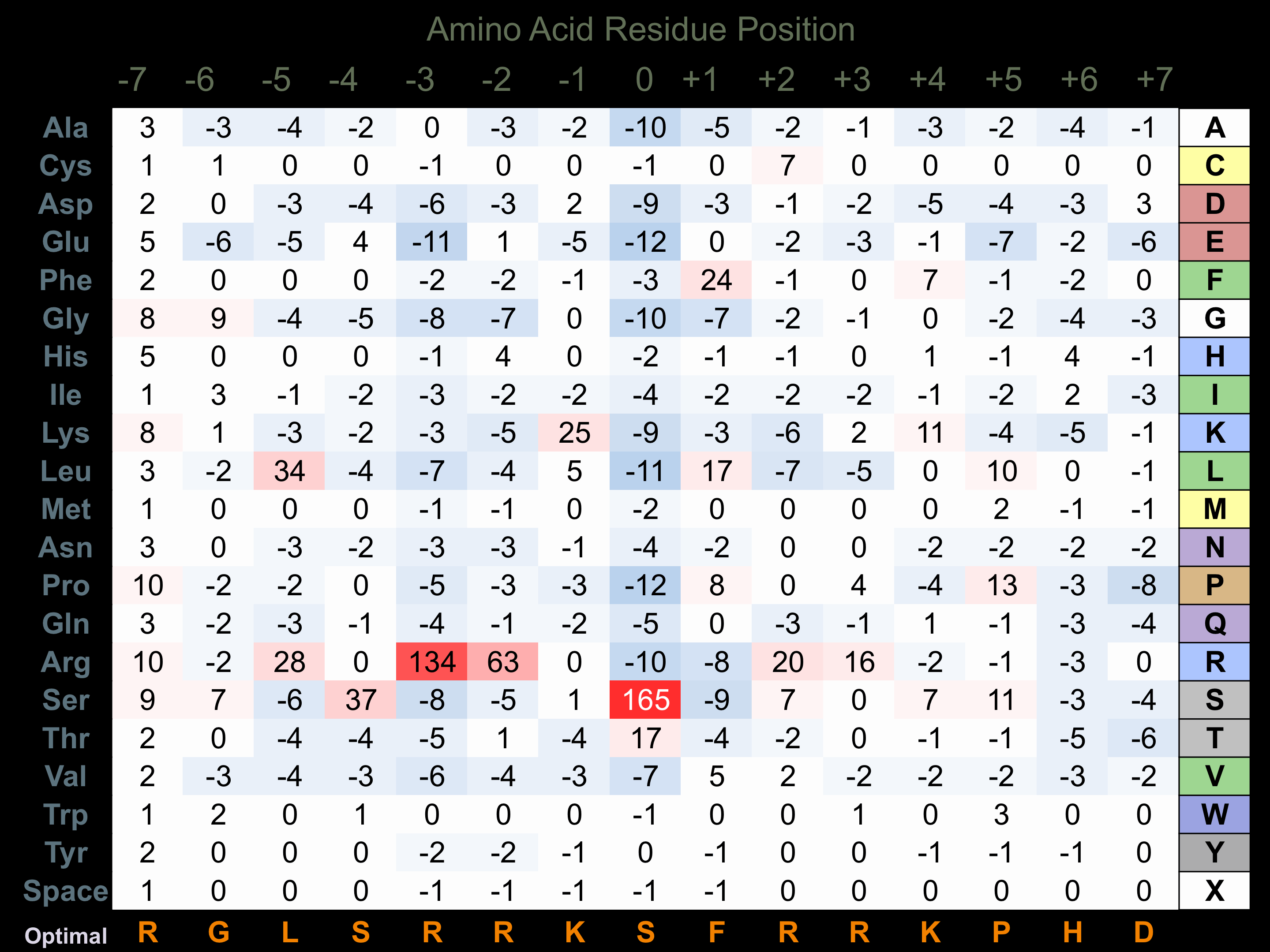Nomenclature
Short Name:
DCAMKL2
Full Name:
Serine-threonine-protein kinase DCAMKL2
Alias:
- DCAK2
- DCDC3
- EC 2.7.11.1
- MGC45428
- Serine/threonine-protein kinase DCLK2
- DCDC3B
- DCK2
- DCLK2
- Doublecortin-like kinase 2
Classification
Type:
Protein-serine/threonine kinase
Group:
CAMK
Family:
DCAMKL
SubFamily:
NA
Structure
Mol. Mass (Da):
83606
# Amino Acids:
766
# mRNA Isoforms:
3
mRNA Isoforms:
85,384 Da (783 AA; Q8N568-3); 83,606 Da (766 AA; Q8N568); 83,478 Da (765 AA; Q8N568-2)
4D Structure:
Binds to and stabilizes microtubules
1D Structure:
Subfamily Alignment

Domain Distribution:
Kinexus Products
Click on entries below for direct links to relevant products from Kinexus for this protein kinase.
hiddentext
Post-translation Modifications
For detailed information on phosphorylation of this kinase go to PhosphoNET
Serine phosphorylated:
S6, S93, S182, S185, S308, S312, S317, S320, S327, S337, S338, S340, S344, S347, S362, S375, S647, S682.
Threonine phosphorylated:
T61, T173, T331, T666, T685.
Tyrosine phosphorylated:
Y83, Y505.
Distribution
Based on gene microarray analysis from the NCBI
Human Tissue Distribution
% Max Expression:
Mean Expression:
Number of Samples:
Standard Deviation:
% Max Expression:
Mean Expression:
Number of Samples:
Standard Deviation:
 92
92
847
32
1167
 3
3
27
11
35
 3
3
28
2
22
 31
31
288
99
459
 53
53
492
29
370
 0.8
0.8
7
83
8
 0.7
0.7
6
34
9
 84
84
774
22
642
 40
40
364
14
240
 3
3
29
82
44
 3
3
28
16
28
 79
79
724
124
503
 1.3
1.3
12
24
15
 4
4
36
6
41
 8
8
71
10
102
 2
2
14
19
20
 38
38
350
86
2250
 3
3
28
6
23
 4
4
34
86
34
 32
32
297
134
297
 52
52
475
8
842
 5
5
42
12
54
 3
3
25
4
24
 3
3
29
6
29
 6
6
52
8
58
 100
100
921
56
1438
 2
2
15
24
18
 4
4
40
6
34
 4
4
40
6
45
 7
7
65
42
50
 0.7
0.7
6
12
5
 55
55
511
47
644
 3
3
32
74
206
 85
85
782
78
674
 4
4
40
39
21
Evolution
Species Conservation
PhosphoNET % Identity:
PhosphoNET % Similarity:
Homologene %
Identity:
PhosphoNET % Identity:
PhosphoNET % Similarity:
Homologene %
Identity:
 100
100
100
100 99.4
99.4
99.4
99.5 96.4
96.4
97
99 -
-
-
97 -
-
-
73 81.9
81.9
83.9
98 -
-
-
- 93.4
93.4
95.4
94 92.6
92.6
95
94 -
-
-
- 71
71
75.7
- 84.5
84.5
89.9
89 -
-
-
84 71.5
71.5
82.4
77 -
-
-
- -
-
-
48 39.5
39.5
57
- -
-
-
40 48.6
48.6
62.1
- -
-
-
- -
-
-
- -
-
-
- -
-
-
- -
-
-
- -
-
-
-
For a wider analysis go to PhosphoNET Evolution in PhosphoNET
Regulation
Activation:
NA
Inhibition:
NA
Synthesis:
NA
Degradation:
NA
Protein Kinase Specificity
Matrix of observed frequency (%) of amino acids in aligned protein substrate phosphosites

Matrix Type:
Predicted from the application of the Kinexus Kinase Substrate Predictor Version 2.0 algorithm, which was trained with over 10,000 kinase-protein substrate pairs and 8,000 kinase-peptide substrate pairs.
Domain #:
1
Inhibitors
For further details on these inhibitors click on the Compound Name and enter it into DrugKiNET or click on the ID's
Based on in vitro and/or in vivo phosphorylation data
| Compound Name | KD, Ki or IC50 (nM) | PubChem ID | ChEMBL ID | PubMed ID |
|---|
Disease Linkage
Gene Expression in Cancers:
The COSMIC website notes an up-regulated expression score for DCAMKL2 in diverse human cancers of 390, which is 0.8-fold of the average score of 462 for the human protein kinases. The down-regulated expression score of 4 for this protein kinase in human cancers was 0.1-fold of the average score of 60 for the human protein kinases.
Mutagenesis Experiments:
Insertional mutagenesis studies in mice have not yet revealed a role for this protein kinase in mouse cancer oncogenesis.
Mutation Rate in All Cancers:
Percent mutation rates per 100 amino acids length in human cancers: 0.08 % in 24690 diverse cancer specimens. This rate is very similar (+ 6% higher) to the average rate of 0.075 % calculated for human protein kinases in general.
Mutation Rate in Specific Cancers:
Highest percent mutation rates per 100 amino acids length in human cancers: 0.38 % in 1259 large intestine cancers tested; 0.35 % in 603 endometrium cancers tested; 0.3 % in 864 skin cancers tested; 0.27 % in 575 stomach cancers tested; 0.17 % in 548 urinary tract cancers tested; 0.15 % in 710 oesophagus cancers tested.
Frequency of Mutated Sites:
Most frequent mutations with the number of reports indicated in brackets: R275C (5); E594G (4).
Comments:
Only 3 deletions, 1 insertion, and no complex mutations are noted on the COSMIC website.

